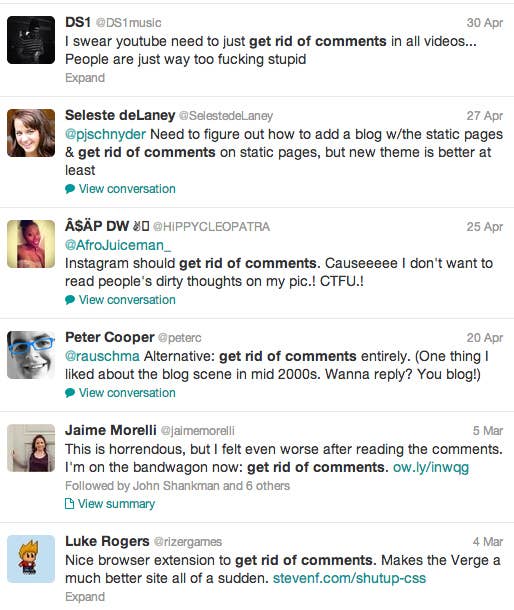
Online, comments have never been more popular or more maligned. Just this week Sports Illustrated had to turn off commenting on Jason Collins' coming-out piece. Earnest calls to get rid of comments seem more frequent than ever. Likewise, newer blogging platforms like Medium boast minimized, hidden, or eliminated comment sections; media outlets like The New York Times seem to be making comments less visible in their designs. Among a certain set in the media, "ban comments" has become orthodoxy: They're ugly. They're mean. They're stupid. They're cheapening. And besides, isn't the real conversation happening on Twitter?
And yet there is substantial evidence to suggest that more people are heading to the bottom of the page than ever before. Disqus, a popular online commenting service, told BuzzFeed the company is close to reaching 1 billion monthly unique visitors to its platform and that 57% of all visits to Disqus-powered pages include time spent in the comments section, a figure that's up from 42% in December 2012. "Our network is growing so fast that we have a challenge keeping up with it," Disqus' vice president of marketing, Steve Roy, boasted.
As such, the thankless job of comment moderation has never been more difficult. Moderators are privy to some of the darkest elements of human behavior. Digital confrontations can sometimes bleed into the physical world; the job exacts a very real and emotional toll. And yet dissonance exists here too: It's the moderators who are, by and large, the most ardent supporters of comment sections.
Justin Isaf, the former director of community for the Huffington Post and longtime moderator, notes that the job can quickly overwhelm even seasoned veterans. "There are times where mentally it's just horrible, and it will twist your view of humanity to quite a degree," Isaf told BuzzFeed. "I've left jobs because I couldn't handle it. It got to a point with my mental sanity where dealing with hatred day in and day out and trying to shape the conversation got the better of me."

As watchdogs, moderators — even those actively participating in their communities — are frequently subject to commentor vitriol. For many commenters, they represent institutional censorship. "In one gaming community I moderated, a volunteer moderator had a breakdown and decided to make it her mission to basically destroy me," Isaf told BuzzFeed. "It was the worst six months of my life. Everything from 3 a.m. phone calls to people creating email addresses in my name and sending horrible messages to former and current clients of mine. It cost me work and, for a time, my reputation. For several months, according to Google, they had me marked as a pedophile," he said.
Andy Page, the creator and moderator of Spoiler TV, notes that a thick skin is needed to handle active online communities. "I used to run another site solely for the TV show LOST...and I actually had several death threats :) but being fairly seasoned at this you just learn to ignore it. I can imagine new site owners might take it more personally," Page wrote to BuzzFeed.
David Williams, community manager for CNN Digital, which sees tens of thousands of comments per day, tries to ignore the hate altogether. "People can be mean, and that is upsetting sometimes. Most people are pretty awesome, though, so I try to focus on that," he said.
There's also the issue of work environment. Many comment moderators are freelancers, working remotely for bigger moderation companies like ICUC or eModeration, and choose the job because it allows them to work from home. While some moderators use the flexibility to travel or pursue side careers, for others the solitary nature of the job can take its toll. "The worst part about the internet is that people never stop commenting," Isaf said. "If you work from bed spending 18 hours a day dealing with hatred, it can be a pretty soul-destroying experience."
"Any time you sit at your computer, you're at work," he continued.
Yet, despite the death threats, personal attacks, and offensive deluge of hateful speech, most moderators enthusiastically defend the practice.
"It is absolutely and completely worth the effort," Isaf said emphatically. "I've been in situations where the best sides of humanity come out, where communities step up with emotional and even financial support for other members. I've watched online relationships fall into the offline world, and it's a beautiful thing to see. I even have friends who've gotten married in these communities after creating very real relationships."
For Page and Spoiler TV, his active community of 30,000-plus commenters is keeping his site alive and relevant. "A site, IMHO, lives or dies by its community," he wrote. "There are other sites that look nicer than ours but have no community. They probably get 10 comments a day on their sites and [users] probably don't come back. We've had members in our community that still come back every day since we started in 2007."
If the numbers from comment services like Disqus are accurate, it would appear that comments — and all their baggage — aren't going anywhere. And for community evangelists like Isaf, that's the way it should be. "People who say you should shut down comments altogether are idiots," he said. "If you can engage these groups and turn them from random numbers on a dashboard to real, meaningful actors that work with and for you, then that's really incredibly powerful stuff."
